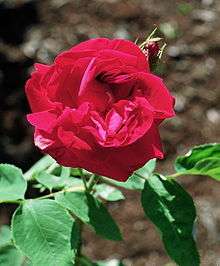Jean-François Jacqueminot
Jean François Jacqueminot, viscount of Ham (23 May 1787 – 3 March 1865) was a French general.
He was born at Nancy, studied at the École Militaire, entered the army in 1803, and distinguished himself at the battles of Austerlitz, Essling, Wagram, and the Beresina. In 1814, he was promoted colonel. When Napoleon returned from Elba, Jacqueminot was made commander of lancers. He made a brilliant charge at Quatre Bras and after Waterloo refused transfer to the service of the Bourbons, was imprisoned for a month. After his release, Jacqueminot established at Bar-le-Duc a great silk factory, which gave employment to many of the veterans of the French Imperial Army. Elected to the House of Deputies in 1827, he joined in the protest of the Two Hundred and Twenty-one against Polignac, and with Pajol directed the Rambouillet expedition which led Charles X to leave France. In 1842, he succeeded Chaud as commander of the National Guards of the Seine. Louis Philippe made him Viscount in 1846. His indecision at the head of the Guards made possible the revolution of 1848, and he was retired in that year.

He died at the age of 78 in 1865.
In 1853, Rousselet named a red rose cultivar 'Général Jacqueminot' in his honour.
References
 This article incorporates text from a publication now in the public domain: Gilman, D. C.; Thurston, H. T.; Colby, F. M., eds. (1905). "article name needed". New International Encyclopedia (1st ed.). New York: Dodd, Mead.
This article incorporates text from a publication now in the public domain: Gilman, D. C.; Thurston, H. T.; Colby, F. M., eds. (1905). "article name needed". New International Encyclopedia (1st ed.). New York: Dodd, Mead.- Jean-Francois Jacqueminot Vicomte de Ham (1787 - 1865)